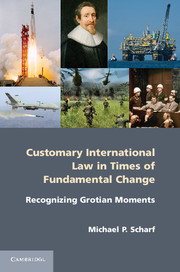Book contents
- Frontmatter
- Contents
- Author’s Biography
- Acknowledgments
- 1 Introduction
- 2 Historical Context
- 3 Theoretical Underpinnings
- 4 Nuremberg
- 5 The Truman Proclamation on the Continental Shelf
- 6 Outer Space Law
- 7 The Yugoslavia Tribunal’s Tadic Decision
- 8 The 1999 NATO Intervention
- 9 The Response to 9/11
- 10 Conclusion
- Index
- References
8 - The 1999 NATO Intervention
Published online by Cambridge University Press: 05 June 2013
- Frontmatter
- Contents
- Author’s Biography
- Acknowledgments
- 1 Introduction
- 2 Historical Context
- 3 Theoretical Underpinnings
- 4 Nuremberg
- 5 The Truman Proclamation on the Continental Shelf
- 6 Outer Space Law
- 7 The Yugoslavia Tribunal’s Tadic Decision
- 8 The 1999 NATO Intervention
- 9 The Response to 9/11
- 10 Conclusion
- Index
- References
Summary
This chapter examines whether the NATO air strikes against Serbia in an effort to prevent ethnic cleansing of Kosovar Albanians in 1999 resulted in accelerated formation of new rules of customary international law concerning humanitarian intervention. It was significant that the situation was unfolding just five years after the UN failed to take action to halt genocide in Rwanda. When Russia and China made clear that they would block the Security Council from authorizing the use of force against Serbia, NATO proceeded to commence a seventy-eight-day bombing campaign without UN approval. The near- universal consensus, however, was that the intervention was justified under the circumstances, leading commentators to label the situation “unlawful but legitimate.” The international reaction to the 1999 NATO intervention prompted the General Assembly and Security Council to endorse a new doctrine known as “the responsibility to protect” (R2P), which would authorize humanitarian intervention in certain limited circumstances in the future. In considering whether the NATO intervention and adoption of the R2P doctrine constitute a Grotian Moment, the chapter will explore the evolving meaning of the R2P doctrine.
Historic Status of Humanitarian Intervention
Since the 1648 Peace of Westphalia, state sovereignty has been regarded as the fundamental paradigm of international law. Leading scholars have described the prohibition of the threat or use of force in Article 2(4) of the UN Charter as “the corner-stone of the Charter system.” This prohibition goes hand in hand with the nonintervention principle enshrined in Article 2(7) of the UN Charter, which prohibits coercive intervention into the exclusively domestic affairs of a state.
- Type
- Chapter
- Information
- Customary International Law in Times of Fundamental ChangeRecognizing Grotian Moments, pp. 157 - 182Publisher: Cambridge University PressPrint publication year: 2013



